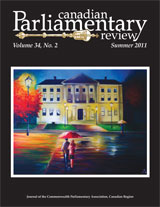A Declaration of Ethics for Presiding Officers?
Speakers have a particular interest in reinforcing proper ethical behaviour. All presiding chairs are cognizant that a respectful and courteous demeanor on the part of members can take the poison out of the atmosphere, can calm a stormy house, and facilitate the restoring of parliament to its ideal state where the fiercest controversies can take place within an ambit of mutual respect, personal honour, and regular procedure for the protection of all opinions, even those of the smallest minority. Other professions, including Judges, have attempted to apply ethical theory to real-life situations and to establish standards for ethical conduct. Since 2000, the Canadian Centre for Ethics and Corporate Policy together with the Conference Board of Canada has been holding a Business Summit to talk about the challenges and potential for business ethics in Canada. Many federal government departments have established the position of Officer of Public Service Values and Ethics for their employees, while smaller departments and agencies assigned additional responsibility for values and ethics to existing executives. This article suggests that Speakers could adopt a Declaration of Ethics for Presiding Officers to outline the importance of ethics in parliamentary institutions.

